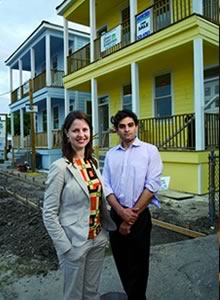For two lawyers in New Orleans, an immersion in politics
When Becca O’Brien ’05 and Ommeed Sathe ’06 returned to HLS last October to talk about building partnerships in post-Katrina New Orleans, they gave a painstaking account of what should, but doesn’t, work.
In a presentation to students in Professor Robert Bordone’s negotiation seminar, O’Brien and Sathe discussed their recent attempt to resolve a conflict between their respective agencies. They explained that as lawyers and former negotiation students, they believed the best way to fix a tense relationship was to isolate the sources of conflict and hash out a precise agreement.
But in the end, their proposal was “dead on arrival,” says Sathe.
It was a lesson he and O’Brien learned in the crucible of New Orleans’ recovery: Personalities and politics don’t always mesh with the precision of legal thinking.
“The word politics is starting to have so much more texture to it,” says O’Brien, who has been the executive counsel to Mayor Ray Nagin since November 2006. “I used to think that it just meant elephants and donkeys hashing it out. Here, politics is relationships, politics is family, politics is identity.”
Sathe, who at the encouragement of O’Brien came to the city in June 2007 to work as director of land acquisition and real estate strategy for the New Orleans Redevelopment Authority, unknowingly walked into what he characterizes as a “cold war” between his office and City Hall.
While political conflict often implies substantive disagreement, Sathe says that in this case the conflict had more to do with which agency owned what part of the recovery. It was a discord exacerbated by pride, reputation, ambition and other human factors.
The two now laugh at their hubris. “We put together a great proposal to fix the relationship,” says Sathe. “A brilliant legal document.”
“But that was absolutely not the point,” says O’Brien.
Ultimately, they say, it took the efforts of a veteran administrator to meet with individuals and sort through the various personal issues hindering reconciliation.
In the meantime, the work of the city’s recovery continues, and despite the 70-hour workweeks and challenges of negotiating learning curves they previously didn’t know even existed, the two friends say they are grateful to be part of it.
“I can’t say enough about the experience in local government,” says Sathe, who previously worked as a real estate and land-use attorney with a large New York firm. “You are where everything finally gets implemented and the decisions you make have such tangible and immediate consequences.”
O’Brien, who had served for a year as director of policy and research for the Office of the Federal Coordinator for Gulf Coast Rebuilding, says during that time she began to notice the local level was “where some of the problem-solving was drifting toward and where the interesting issues were being worked out.”
As a senior policy adviser for the mayor, O’Brien says she has the luxury of looking at long-term strategic issues and tends to gravitate toward facilitating those that need interdepartmental cooperation. Among other things, she’s been involved in creating integrated operating and capital budgets, writing requests for state and federal support of the city’s capital program, and crafting policy positions to enhance local housing options.
Sathe manages a staff of six at the New Orleans Redevelopment Authority and expects that number to double soon. NORA has a state mandate to acquire blighted property and redevelop it. In his time at the agency, he has instituted a pilot program to auction off blighted property to entities capable of developing safe and affordable housing, initiated a land-acquisition program to support the development of a new medical district, and developed ways for home buyers to take advantage of New Market Tax Credits and regional post-hurricane tax incentives.
In drafting the city’s position concerning a request to allow federal money from FEMA to be used for permanent housing in the city, O’Brien turned to Sathe.
“I have zero experience in housing programs,” says O’Brien. “I asked Ommeed what the world would look like if these funds were actually available.”
Using the same deliberative process that met with something less than success on their first collaboration, the two drafted a memorandum that was eventually approved by the mayor and incorporated into a proposal he took to Capitol Hill, where, they say, it’s been favorably received.
Every victory is earned in the renewal of this city, and the challenges are immense, O’Brien and Sathe say. These days, they wear their loyalty to their adopted home and colleagues on their sleeves.
“I am privileged to be allowed into the most fraught, challenging, taxing, wearing, inspirationally committed group of people in the most amazing situation that any of us will probably see in our generation,” says O’Brien.
“We are 27 months out from the worst natural disaster in American history, and we have returned 70 percent of our population and restored all basic city services,” says Sathe, who chafes at media stories about the slow pace of recovery. “Somebody needs to make a case that that is an incredible performance.”
